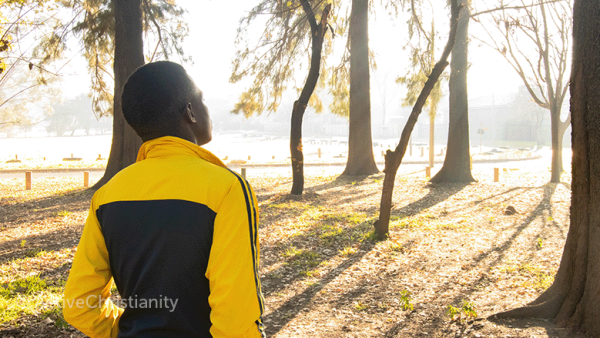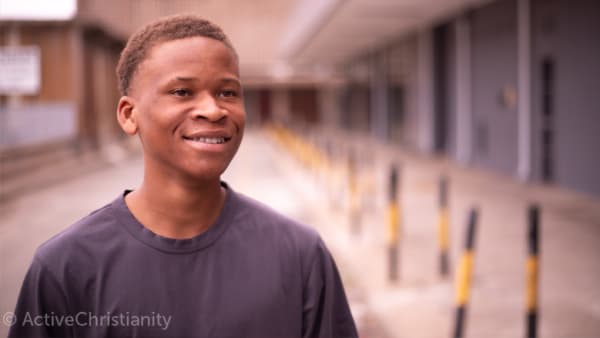How do I know if God is real?
“Discovering” that God is real is a very personal experience. Everyone experiences this in a different way. As a science student I went from being an atheist - not believing in any god - to becoming a Christian, and I hope my story can be of help to those who struggle to believe that God is real.
I grew up as an atheist. My goal in life was to prove things are true through science. I specialised in maths and physics in high school, and later completed a degree in Applied Physics at university.
There isn’t physical evidence that can be used to prove or disprove that God exists. This means that it wouldn’t be scientific to claim that God does or doesn’t exist. So to believe in God or not, is something we have to choose ourselves.
When I was younger, I chose not to believe in God. I felt that Christians acted as if they were better than others – they said that they believed in God, but at the same time they lived unrighteous lives. This hypocrisy disgusted me. I didn’t want to believe that God had a plan to bring salvation for such people.
What science can’t do
As I grew older, I began to have questions that science does not have answers for. I often wondered: “What is my purpose in life?”
There were many things I wanted to achieve, but it wasn’t long until I became discouraged. I sensed that something was lacking in my life. I felt the fear of uncertainty and emptiness. I was afraid of failing.
Science gives us a way to prove our theories. But science couldn’t give an answer to the struggles and questions I had in my life.
A new understanding of Christianity
In the time I was struggling with these questions, a classmate convinced me to visit the church that he went to. At this gathering, someone read from a book written by the founder of their church, Johan Oscar Smith. A few sentences caught my attention immediately. “The world and its lusts are nothing; they are emptiness. The pleasures of the world are just a glittering gateway into even greater emptiness.”
I felt this was true! As a young person, my heart was longing to belong somewhere. I wanted to become something, wanted to be accepted so that people would “love” me! And I feared that if I should fail, they would reject me. That was why I worked so hard, for money and fame! But this only led to a greater need to be praised and accepted by others! In short, I saw how I was drawn by the pleasures and lusts of this world – and it was clear to see that it wasn’t going to end well.
Now I understood my feelings of emptiness; feelings which science could not explain or provide an answer for. But what could I do to become free of this?
In the time that followed I kept going to these gatherings to learn more about what for me was a new understanding of Christianity. I heard more about the cause of many of my struggles: the sinful lusts and desires that exist within myself, or my own demands and expectations. I wanted to be accepted by others, but I also had expectations as to how they should behave towards me. I got irritated and offended when they did not behave towards me as I wanted, and I found that I could not truly love them.
What really kept me bound was myself. And the answer Christianity gives, is to follow Jesus’ example of overcoming sin. Jesus had the same lusts and desires in His own nature during His days on earth. (Hebrews 4:15.) God gave Jesus power to overcome, because He was willing to obey God’s will instead of giving in to the temptations He faced. And now I can do the same.
Doubting and double standards
To begin with, I didn’t understand how important this answer was, and I struggled with how I could overcome my own sinful nature when I was tempted to sin. As I struggled with this, I began to see how very weak I was.
When I was tempted to sin, I started doubting, and I started wondering if these desires really were so serious and if it really was sin, and I also wondered if God was willing to help me if He ever existed at all. I found myself giving in to sin again and again. How could it be that the more I tried, the further I came from overcoming that rottenness in my nature? I just wasn’t strong enough.
But I couldn’t give up because something that was becoming more and more real for me was what the Bible says about the result of following these lusts and desires. “You will always harvest what you plant. Those who live only to satisfy their own sinful nature will harvest decay and death from that sinful nature. But those who live to please the Spirit will harvest everlasting life from the Spirit.” Galatians 6:7-8 (NLT).
The more I gave in to my sinful desires the more I was bound by them. I was ashamed of myself, and I longed to overcome these lusts and sinful desires.
What I really needed was faith.
“Faith.” I hated the idea.
It is written that “faith means being sure of the things we hope for and knowing that something is real even if we do not see it.” Hebrews 11:1 (NCV). Faith is a belief that does not rest on logical proof or physical evidence. It seemed like the opposite of how science works, which is based on logical proof and physical evidence. How could I know that God was true, without logical proof or physical evidence? It bothered me.
But then these verses in the Bible helped me: “… you must believe and not doubt at all. Whoever doubts is like a wave in the sea that is driven and blown about by the wind. If you are like that, unable to make up your mind and undecided in all you do, you must not think that you will receive anything from the Lord.” James 1:6-8 (GNT).
I was just like that man who was driven and blown about by the wind, undecided in all he did and not receiving the help I needed from God. That verse showed me that there was great hypocrisy in my doubts. As a science student, I learned to doubt, to ask questions and to do experiments to see if my theories would work! But what had I been doing? I had been doubting if what I heard was true, but I hadn’t put the words to the test!
I realised that I was using double standards when dealing with science and faith. What was worse, if I would keep on doubting, only trusting in myself, I could never overcome my sinful lusts and desires.
Faith is a decision
There was only one thing left that I had to do to know if God was real or not: to give myself over to Him and trust in Him completely, with no doubting, and see if His Word really worked!
I chose to believe God’s Word when it told me what sin was. I asked God for the power to follow Jesus’ example of overcoming this sin. And when I was tempted to give in to my sinful desires, I began to pray to God for power to say No to them again and again, until I started to overcome! Over time, I started overcoming the lusts and desires that had bound me.
The spiritual world and the scientific world
I also realised that the source of my doubt came from my own arrogance. I studied and understood the scientific world, which is one part of life, but I did not want to try to test and understand the spiritual part. While I thought I was being “intellectual”, I was actually keeping myself from coming to true understanding.
There is a spiritual world that exists together with the scientific world that I had been studying. God is spirit. (John 4:24.) We as humans also have a spirit. Through my spirit, I was able to hear God’s voice calling me to be finished with the old life that had bound and weighed me down! And now God has proved to me that He is real because I see what He does in my own life!
Physics and mathematics are still a great part of my life - here I can question things and seek answers. But I will not allow any doubt that hinders me from overcoming my own destructive lusts and desires.
“Without faith no one can please God. Anyone who comes to God must believe that he is real and that he rewards those who truly want to find him.” Hebrews 11:6 (NCV).




